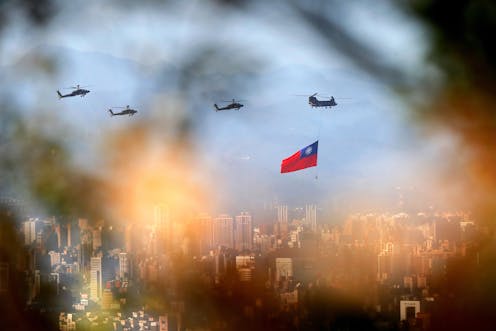When people say the West should support Taiwan, what exactly do they mean?
- Written by The Conversation

There is a growing antagonism towards China in Western commentary, provoked by its treatment of the Uighurs, Hong Kong and Taiwan, its activities in the South China Sea and its role in Sri Lanka’s debt crisis.
Some of this commentary is undoubtedly justified. But is the West sleepwalking to war with China – and would it be a just war, or a foolhardy act of declining powers?
In Western China, the Uighur people are being mistreated, no doubt about it.
Britain leased Hong Kong from the Chinese and gave its people almost no democracy. Complaining now about China’s behaviour there is like tenants asking for repairs to be done to an office building 25 years after they’ve left. We might not like what is happening to Hong Kong, but it is Chinese territory.
China’s claims in the South China Sea using its the semi-fictional “Nine-Dash Line” stand up to almost no historical scrutiny. They are largely false.
As for Sri Lanka’s debt, 9.8% is held by the Chinese. That’s not a typo: less than 10% of Sri Lanka’s debt is held by China. The rest is held by Japan, the Asian Development Bank and private lenders. How is Sri Lanka’s gross mishandling of its own economy somehow China’s fault, when it holds less of Sri Lanka’s debt than Japan does?
So far it’s a mixed report card for China.
But what of Taiwan? Voices are saying more loudly, especially since Russia invaded Ukraine, that Taiwan’s independence must be supported.
The problem, though, is that Taiwan is not independent, has not claimed independence, and indeed still claims to be the government of all of China.
That isn’t a typo either. Taiwan claims to govern all of China.
History matters
How could Taiwan make that claim?
Rival Chinese nationalists and communists united during the second world war to defeat Japan, then descended into a brutal civil war of their own.
Communist forces gained the ascendancy and nationalist forces fled to Taiwan, where they partly displaced and repressed the indigenous peoples. Nevertheless, the international community continued to recognise the nationalist forces in Taipei as the government of “all of China”, including by allowing them to hold the UN Security Council seat for China.
Chinese communists in Beijing played a long game and supported many pro-independence movements in Africa. This paid off big time in 1971, when many of the newly independent African countries pushed for UN General Assembly Resolution 2758, which changed the UN’s recognition of the government of all of China from Taipei to Beijing.
The resolution clearly states that the communist powers in Beijing are “the only legitimate representative of China to the United Nations” and removed “the representatives of Chiang Kai-shek” (Taiwan) from the UN.
When UN Resolution 2758 was voted on, Britain, Canada and European countries supported recognising Beijing rather than Taipei as the seat of Chinese government while keeping the sovereign territory as a single whole.
The US and Australia voted to keep recognising the government in Taipei. It was the first time Australia had voted against Britain and with the United States on a major issue.
Today, all members of the UN, bar 13 small countries, recognise the government in Beijing as the government of “all of China”. The US does, Britain does, all EU states do and Australia does.
Competing claims
So where is this independence that some want the West to go to war to defend?
The UN could perhaps have recognised Taiwan and China as two countries. But it didn’t. One of the reasons it didn’t is that the government in Taipei didn’t ask to be independent.
To this day, the constitution of Taiwan claims to govern all of China and even makes temporary provision in its constitution for voting in “free China” until “reunification”.
So, mainland China claims Taiwan to be a “renegade province”. Likewise, the Taiwanese constitution paints mainland China as the renegade.
Read more: Is Australia in the firing line of a new Chinese campaign against the US?
The underlying truth in Taiwan is that the Chinese civil war, started in the 1940s, has never formally finished.
So, when people say the West should support Taiwan, what exactly do they mean?
Do they mean a status quo of what the Americans call “strategic ambiguity”?
Do they mean supporting independence when Taiwan hasn’t declared it?
Do they mean forcing the continuation of the civil war’s stalemate until a formal resolution?
Do they mean supporting the Taiwanese constitution’s claim to govern all of China – that is, continue the civil war until the communists are pushed out of Beijing?
High-risk talk
Words are increasingly important. The status quo can only be maintained while Beijing sees it in their best interest not to act. But the more people talk of Taiwan’s independence, or talk of going to war, the more China is pushed into a corner.
And while nothing can justify Vladimir Putin’s invasion of Ukraine, nor his atrocities in Ukraine, we can see that sometimes “virtue signalling” has unintended consequences in international affairs.
Taiwan is not independent; nor has it claimed to be. Calling for “support to Taiwan”, like calling for “NATO expansion”, has clear dangers. Policy-makers need to tread very carefully: a conflict with China and Taiwan will make Ukraine and Russia look like the preview, not the war.







